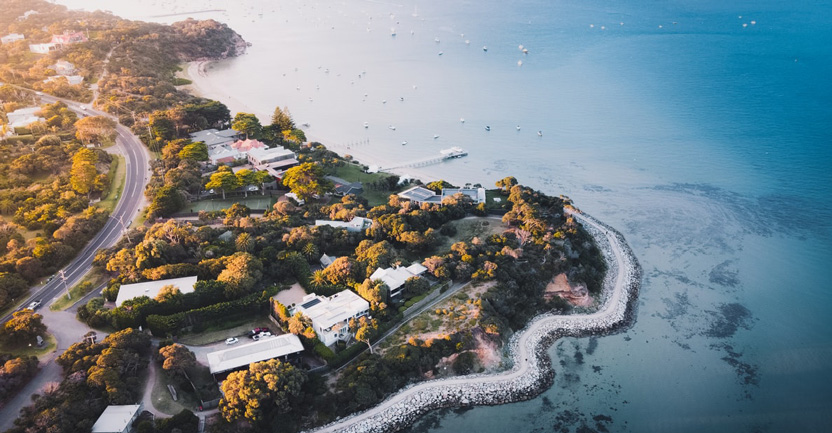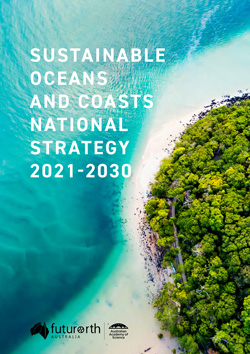Cooperation, grassroots action and First Peoples’ knowledge will unlock Australia’s blue economy
- 4 mins read


85% of Australians live within 50 kilometres of the ocean, placing them within the ‘blue ribbon’—the interconnected waterways, coasts and seas that surround Australia and support major industries, provide recreation and cultural heritage to communities, and offer new economic frontiers like offshore energy.
But there is an urgent need to manage this blue ribbon in a more sustainable way, to both build resilience to threats and position Australia for the huge opportunities associated with a sustainable blue economy.

A ten-year strategy launched today by Future Earth Australia, a program of the Australian Academy of Science, presents a national implementation plan to ensure healthy coasts and oceans for a just and environmentally sustainable future.
The strategy was launched at the Sustainability Research & Innovation Congress 2021, the world’s first transdisciplinary gathering in sustainability. Representatives from research, industry, government and civil leaders from over 110 countries are attending the conference.
The strategy is a bottom-up, cross-sectoral plan that was developed through deep consultation across the country, with strategic oversight from an Expert Working Group composed of leading ocean and coastal researchers and practitioners.
Director of Future Earth Australia, Dr Tayanah O'Donnell, says a lack of national coordination and integration has held our oceans and coasts back from being of benefit to all Australians.
“This strategy outlines the steps needed to transform how we think about, govern and protect oceans and coasts across Australia, and will serve as a blueprint for the national change that Australia’s oceans and coasts need,” says Dr O'Donnell.
“It also provides evidence-based ideas and frameworks that can support existing initiatives, such as the Government’s $100 million oceans and coasts investment package announced in April, and positions Australia to lead on the international stage during the United Nations Decade of Ocean Science for Sustainability.”
Among the seven recommendations in the report is a call for a national agency to coordinate ocean and coastal governance across all tiers of government.
Emeritus Professor Nick Harvey, co-chair of the Expert Working Group, says that each state has a different approach to coastal management.
“The strategy recognises that our oceans and coasts do not respect state or other jurisdictional boundaries. We need a coordinated and sustainable management approach involving all levels of government.”
In addition to this top-down call for coordinated governance, the strategy highlights the key role of local, grassroots initiatives that increase community trust and promote local stewardship of oceans and coasts.
The success of this approach can be seen in Coastcare, a successful Australian community-based coastal stewardship program that linked three tiers of government and the community toward a common purpose, using a combination of local and federal funding for a network of regionally based staff working to manage our coasts.
CSIRO’s Dr Beth Fulton is co-chair of the Expert Working Group. She says multi-level approaches like these can provide great opportunities for coastal and remote communities without having to put ecosystems on the line.
“We are sitting on the cusp of a future based around the oceans, so it is important we get it right from the start because oceans are so central to how our ecosystems, atmosphere and communities work,” Dr Fulton says.
The strategy also recommends that First Peoples’ knowledge and practices be elevated into ocean and coastal management to empower Indigenous leadership.
Professor Martin Nakata of James Cook University, a member of the Expert Working Group, says the immense value of connecting across knowledge systems can be seen in the successful land and sea management strategy for the Torres Strait.
“This brought together western science, management experience and the knowledge of Traditional Owners to jointly determine a vision and agree on the best pathways and mechanisms to achieve that vision.”
Expert Working Group member Professor Emma Johnston from UNSW Sydney says the most difficult challenge will not be the development of sustainable practices, but their implementation.
“This is the decade of reckoning: reckoning the impact of humans on our oceans and coasts and reckoning for past mistakes (and misdeeds) in environmental management,” says Professor Johnston.
“Our future depends on the creation of just, agile and highly integrated governance for our rapidly changing oceans and coasts.”
Read the Sustainable oceans and coasts national strategy 2021–2030
Future Earth Australia
Future Earth is a global sustainability, research, and innovation network. Future Earth Australia is the Australian and Oceania arm of Future Earth. It enables Australian researchers, governments, industry and NGOs to collaborate with each other and with international networks.





